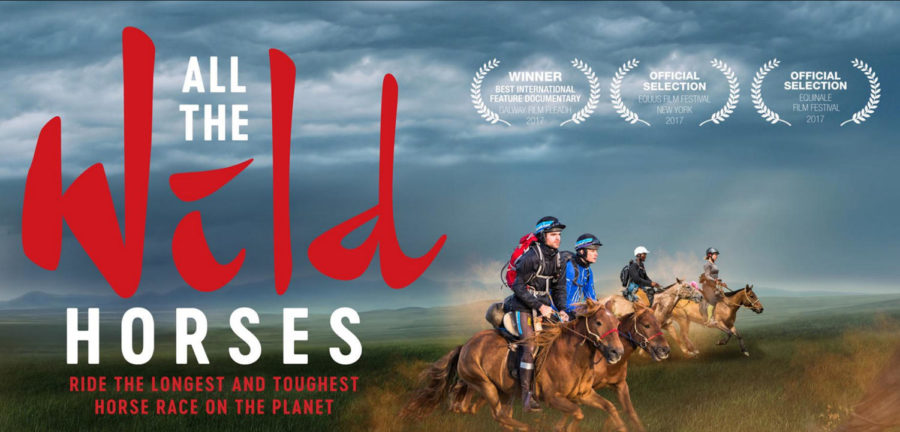Ivo Marloh believes that to make a good film, you must live the film. This philosophy inspired him to create the award-winning documentary, “All the Wild Horses.”
Marloh visited the Petaluma Cinema Series at the Santa Rosa Junior College’s Carole Ellis Auditorium on March 28 to speak with students and the community. The event was produced in collaboration with the Petaluma Film Alliance.
SRJC film instructor Michael Traina prefaced the screening with an interview and led a Q&A with the audience in attendance after the film.
“All the Wild Horses” was the culmination of three visits Marloh made to the Annual Mongol Derby, the longest horse race in the world, covering 700 miles across Mongolian wilderness and spanning more than 10 days. The film has already won eight international film festival awards as well as several nominations.
“I had never been to Mongolia before making this film,” Marloh confessed, invoking murmurs of surprise from the audience.
Marloh’s early fascination with horses began during his childhood. “I practically grew up on horseback at our family farm in Holland,” he said. “As soon as I read about the derby in Mongolia, I knew it was something I had to do.”
To document the racers’ journeys, Marloh had to participate on wild horseback. With his Olympus camera and equipment in tow, he rode alongside the racers, capturing their stories as well as the scenic steppes of Mongolia.
Participants included Devan, a determined young woman from the United States, an Irish jockey named Donal, as well as Monde, the first black person to ever take part. The races he documented were particularly bloody, resulting in a broken spine, collar bone, ribs, vertebrae and countless bruised egos.
Traina turned the discussion to focus on Marloh’s early career as a filmmaker and how he came to make a documentary.
Marloh explained that making a documentary is not too different from writing a fictional script. “When you start writing a script, everything changes,” he said. “All of your characters come to life.”
Inspired by a book on screenwriting gifted by an acquaintance in 2000, Marloh wrote a couple of shorts before earning a master’s in screenwriting from the Royal Holloway University in London. He later worked as script editor and contributing writer on international feature films in the U.S., the UK, Asia and Europe.
Some of his writing credits include “Magic Boys” (2012), and the multi award-winning sci-fi thriller “Cycle” (2013).
“In order to start filming, you need the money,” Marloh said. “Our reality is a lot different than it is here. In the UK there is a lot of public funding when it comes to film.”
Marloh finally raised enough funds to take a tiny, highly skilled crew out to Mongolia. Creating a story from filming on one trip proved difficult because the racers had to cover a large amount of terrain. “I’m a screenwriter. I wanted the story,” Marloh said. They finally got the footage they needed after making two more trips to the derby.
Traina asked Marloh if he had gotten any offers to feature his film on streaming platforms. “I had gotten a few offers from companies such as BBC and PBS, but they wanted to cut the film down to one hour,” Marloh said. “Doing this would cut out the character’s stories, leaving you with a documentary about just Mongolia.” He could not allow these changes for risk of altering his story.
“Without the story of the riders, it’s just a documentary on the landscapes of Mongolia,” Marloh said with a laugh.
After the screening of the film, the audience was able to ask the director questions. The first question was probably on everyone’s mind, “Since you had to race, what place did you come in?”
“Well, obviously I wasn’t there for the competition,” Marloh said, “but the first time I managed 12th place, the second time I got a penalty and came in eighth.”
A student asked about the inspiration behind the music chosen for the film, referring to the enchanting sounds of traditional Mongolian throat singing and other contemporary styles. “Before I even started filming, I had started collaborating with the Mongolian musical artists Altan Urag,” Marloh said. “The music, as well as the wild sounds, were a very important part of the story.”
Although the documentary spanned several derbies, the spirit of the race and hospitality of the locals remained unchanged between visits. When asked about tips for travelling in Mongolia, Marloh said, “Be kind and eat their food, which was kind of challenging to be honest,” referencing the time he got very ill after eating local cuisine for the first time.
A curious audience member asked Marloh if he had ever met her friend, Sonoma County local Adam Perlman, during the race. The director recalled their pleasant but brief encounter before Perlman was left behind in the race. “You had to be really strong to do it,” Marloh said. “You can’t just want it. You also have to be physically fit.”
Ivo Marloh’s next stop on the festival circuit is in Arizona for the Phoenix Film Festival April 5 .



